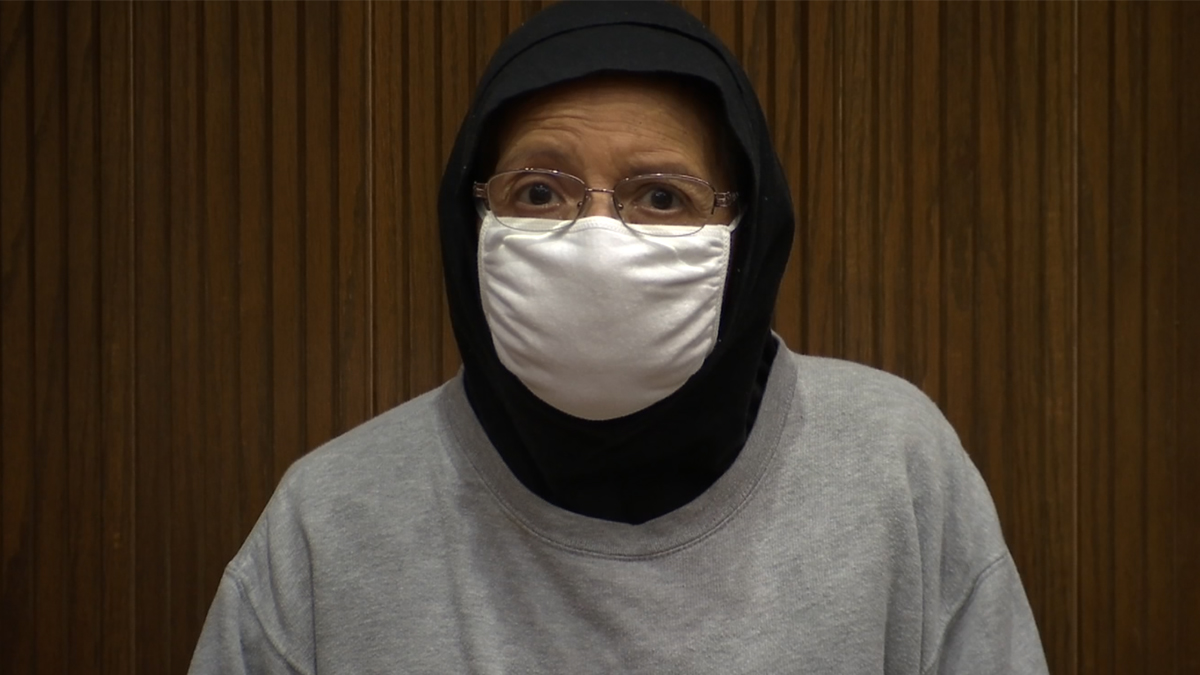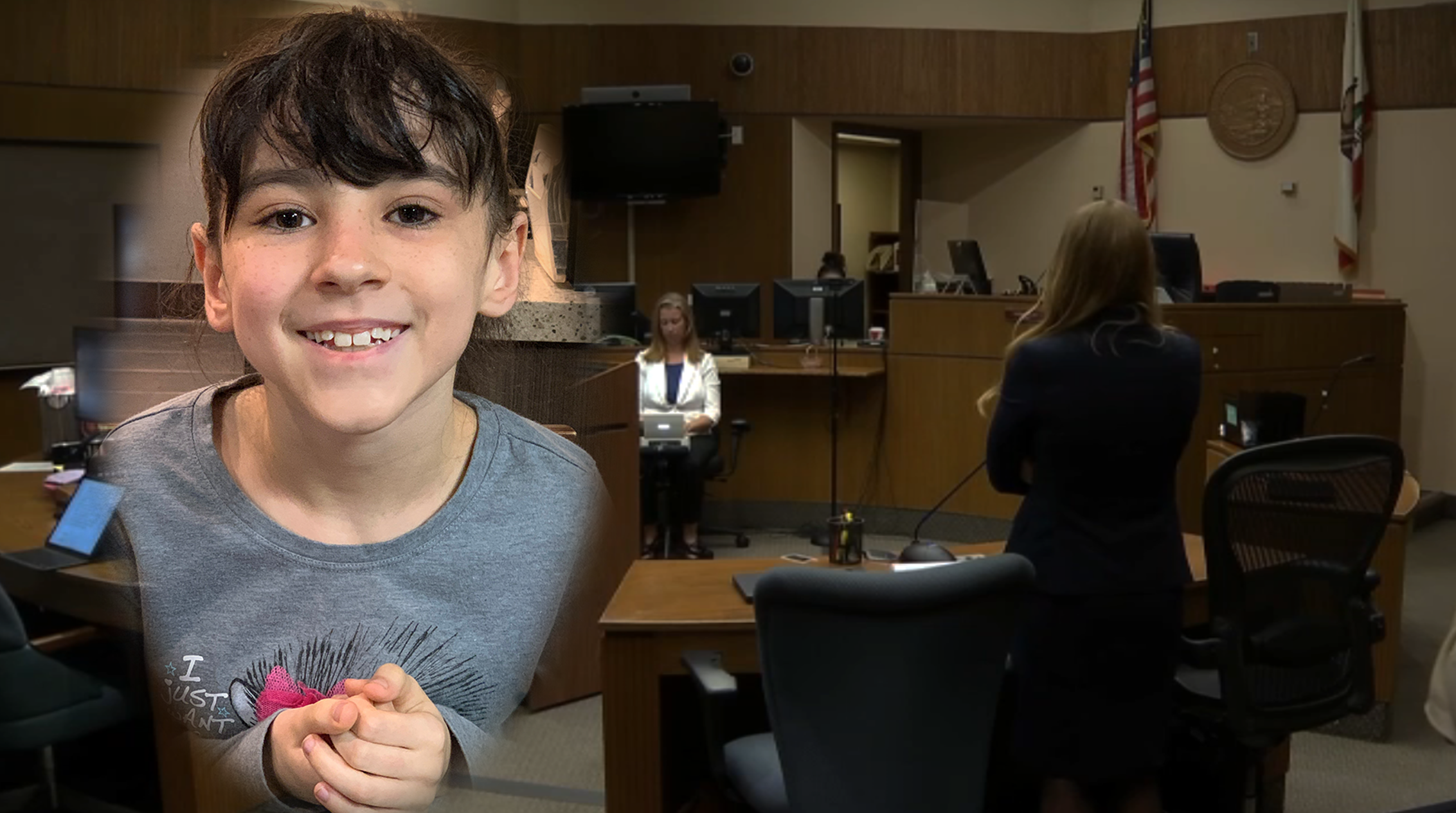Social workers investigated reports of suspected child abuse years before prosecutors say 11-year-old Arabella McCormack was tortured and starved to death by her adoptive family. That’s according to hundreds of internal documents from San Diego County’s Child Welfare Services Department.
Those internal documents show Child Welfare Services investigated those suspected child abuse reports but determined the accusations were unfounded. Arabella’s adoption was approved about a year later.
According to the internal documents, Arabella’s adoptive parents, Brian and Leticia McCormack, called 911 last August, saying the child choked on chicken broth. Paramedics say they found Arabella on the floor without a pulse. A deputy on the scene reported the girl looked like “a corpse with skin stretched over it.” She died less than 10 hours later at the hospital.
Months later in a courtroom in El Cajon, a deputy district attorney described the state of Arabella’s body as what she said was the result of years of torture, abuse and starvation.

NBC 7 Investigates has spent months digging for answers, running down tips and working to confirm information we were hearing from people close to the case. The biggest questions we had included:
- Did anyone report suspected abuse to Child Welfare Services?
- If yes, how were abuse reports investigated?
- What were the circumstances surrounding Arabella’s adoption?
Battling for information
NBC 7 Investigates has been repeatedly denied answers to these questions by San Diego County Child Welfare Services, the San Diego County Sheriff’s Department and the San Diego County District Attorney’s Office. The Sheriff’s Department & District Attorney’s Office cited an exemption that was created to protect active investigations and prosecutions.
Child Welfare Services cited another exemption created to protect minors, because revealing information about Arabella could also publicize details about her surviving sisters.
In October, NBC 7 Investigates filed a court petition to gain access to Arabella’s juvenile records. With a judge’s ruling, California law allows the public to get those kinds of records after a child dies. Our team appeared in court multiple times, arguing that the public had a right to know the answers to the questions listed above.
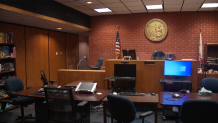
The exact details about what happens in juvenile court proceedings are ordered to be kept secret. We can report that several parties opposed our attempts to access Arabella’s records. They argued that her case file contained numerous references to her surviving siblings and that the record’s release would be detrimental. Our petition only sought information about Arabella.
Five months later, the judge granted our petition to access more than 1,200 pages in Arabella’s case file, but with several important exceptions: the judge & Child Welfare Services would first review the documents and redact anything that would reveal information about her siblings or any personal information about the people who reported suspected child abuse. After that lengthy review, NBC 7 Investigates obtained those records in May.
While the court granted NBC 7 access to report the information contained in the documents, we only have permission to publish certain pages. For our reporting, we took extra steps to further redact documents that could potentially identify other minors, identify reporting parties, or disclose personal or contact information. We’ve included these documents below so the public can get a full account of the investigations that took place.
First investigation into suspected child abuse

Back in 2018, one year before the adoption was finalized, someone associated with Arabella's school called San Diego County Child Welfare Services to report suspected child abuse. At that time, Arabella was just 7 years old. During the investigation, two school workers at Highlands Elementary School separately shared concerns about unusual rules and controlling behaviors of the McCormacks, who were still Arabella’s foster parents at the time. The concerned school employees said the McCormacks:
- Restricted Arabella’s food intake
- Restricted Arabella’s water intake to just one dixie cup per day.
- Only wanted her to be permitted to use the restroom twice per day at school
- Didn’t want Arabella using scissors, citing fears of self-harm. However, school employees reported Arabella had never exhibited those types of behaviors
- Didn’t want her to use markers in class and didn’t want her rewarded with any classroom leadership responsibilities like being a “line-leader”
- Required daily reports from her teachers about her behavior
According to the documents NBC 7 Investigates reviewed, one of the school workers said, “it’s all about control.” In addition, one school employee said Arabella told them that she slept on the floor, without a bed or bedsheets, with a pillow as a form of punishment. They said Arabella spoke with a school worker about the movie “Annie.” The report states Arabella told the worker, “she is not like Annie because when Annie got adopted, all her hurts were gone; however, the child states that she is still hurting.”
Over the next two weeks, the social worker made two surprise house calls, but no one answered the door. After planning a visit over the phone, the social worker sat down with Leticia and Arabella at their home. That took place nearly one month after the calls from the school. The caseworker later talked to Brian over the phone. All three, including Arabella, denied any abuse. The caseworker closed the case as “unfounded.”
Nicol Stolar-Peterson analyzes child-abuse cases as an expert witness. She spent more than a decade working as a child-abuse investigator for child protective services, but not in San Diego County. After NBC 7 interviewed Stolar-Peterson, she was hired as an expert witness in an anticipated civil suit against the county relating to Arabella’s death.
“My first concern is not seeing the child at the school,” Stolar-Peterson told us.
Stolar-Peterson says interviewing kids at their foster home is like trying to interview a domestic violence victim at the home of an abuser. She said that visiting children in a neutral location, like a school, is paramount to gaining a child’s trust, creating a sense of safety and getting to the truth.
“The interview of a kid is like gold,” Stolar-Peterson said. “It just has to be done well. It just has to be done well…. Kids deserve to be listened to, but that only works if they feel safe, and that only happens if you build a rapport and have a solid interview.”
The social worker who was investigating the suspected abuse never visited Arabella at school, according to the case documents. However, her assigned case worker did visit her at school during this time. He did not ask about all of the concerns that had been reported, but did ask about her sleeping arrangements. According to the case file, she told him she had been sleeping on the floor because she had been disrespectful, but said it did not hurt.
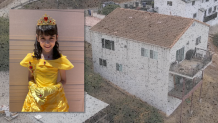
In her interviews with social workers, Leticia explained restricting Arabella’s food, claiming that Arabella had a medical condition, and spoke of stomach issues.
“Anytime something like that happens, my next question is, I’d like to talk to the doctor,” Stolar-Peterson said. “Who says this is what the diagnosis is? What would happen if they had more than one cup of water?”
None of the records the county gave us show evidence of a case worker reaching out to any medical professional to confirm Arabella’s nutritional restrictions.
“This is typical,” Stolar-Peterson said. “This is Social Work 101. This is what we do as social workers.”
Stolar-Peterson also said limiting rewards for a child is a key piece of information for investigators.
“To not want to build up your kid’s self-esteem is extremely concerning, because most parents want their kids to have good self-esteem and become leaders,” Stolar-Peterson said. “To block that is purely punitive.”
Less than a month after the social worker investigating the report closed their investigation, internal files show CWS got another call. Again, from someone tied to Arabella’s school.
Second investigation into suspected child abuse
Interviews with several school employees confirmed an alarming incident at an after-school program. They reported that Brian grabbed 7-year-old Arabella and pinned her down, trying to see if she had candy in her pockets.
Witnesses said she “screamed bloody murder.” When asked to leave, they said, Brian dragged Arabella to his car. Arabella later told school workers that, once at home, her parents stripped her of her pants and dumped cold water over her head.
“If they’re willing to go that far in front of other people, especially mandated reporters like school staff, that’s extremely concerning,” Stolar-Peterson said. “Now I’m really concerned about what is happening at home.”
Once again, a social worker made a surprise house call, and once again, no luck. Though this time the caseworker noted cars in the driveway. Again, instead of a surprise home interview, the caseworker set up a planned visit. One week after the incident, while Arabella’s alleged abusers were in the kitchen, the caseworker interviewed Arabella in the living room. The girl said things were fine. Again, there’s no record that a caseworker visited Arabella at school.
Documents show Leticia told the investigator Arabella wasn’t allowed to have candy because sugar made it difficult for her to calm down. She also said Arabella was having dental issues and again noted past stomach problems. Leticia also told the social worker that Arabella had ADHD, PTSD and oppositional defiant disorder. Leticia said she had been trained that cold water calms down a child when they are “raging.”
Stolar-Peterson told NBC 7 that those conditions are often overdiagnosed and said the technique of using cold water is applied by having the child drink the water, not by pouring it on their head.
The caseworker once again ruled the abuse report as “unfounded,” but this time Arabella’s foster parents told the caseworker they were pulling the child out of public school and into home school.
In all her years as a social worker, instructor and expert, Stolar-Peterson said she has never seen a county allow a foster child to be home-schooled, but that’s exactly what happened to Arabella.
“A lot of sirens go off,” Stolar-Peterson told us. “Very concerning because it’s isolation.”
Stolar-Peterson said Arabella’s death is just one example of why caseworkers need more training on how to conduct their own investigation instead of just taking what alleged abusers say.
“Typically when I go back through cases, I will see that moment where my heart drops when I’m reading the case,” Stolar-Peterson said, “and think, that was the moment, that was the chance, that was the opportunity.”
Child Welfare Services declines to comment
NBC 7 Investigates repeatedly asked for information and on-camera interviews with Child Welfare Services Director Kim Giardina, before and after obtaining Arabella’s records. The county spokesman declined our requests, citing the pending litigation. We also offered to speak generally with officials about the policies and procedures that social workers follow when investigating abuse. They again declined but provided a link to county policy manuals that didn’t specifically answer our questions.
Documents reveal more about Arabella's death
The medical report also contains 30 photos taken of Arabella before and after her death. The photos are extremely disturbing, showing her injuries and malnutrition. NBC 7 Investigates got the court’s permission to publish two of those photos. One shows her emaciated leg and knee. Another photo shows one of her swollen hands. These images convey the most accurate representation of Arabella’s physical condition at the time of her death in a way words cannot.
Warning: The following images are disturbing and depict Arabella's injuries just before her death.
The criminal case continues against Arabella's adoptive family
Prosecutors have yet to fully reveal what they believe happened inside the home in the months before Arabella's death, but what they have shared has been shocking. In court, Assistant District Attorney Meredith Pro painted a picture of system of child abuse and torture at the hands of Arabella's adoptive mother, adoptive grandfather and adoptive grandmother. Pro said Arabella and her younger sisters were hit with paddles and sticks, deprived of food and water, isolated in their rooms, denied access to bathrooms and forced to participate in rigorous exercises.
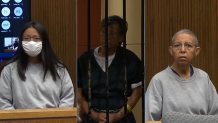
In a court hearing, Pro said Leticia McCormack “held herself out to be a pillar of the community yet secretly in her home she is starving and abusing her children and encouraging it.” Leticia was a volunteer and ordained youth ministry leader for The Rock Church in San Diego. Arabella's adoptive grandparents, Stanley Tom and Adella Tom, were volunteers with the San Diego Police Department’s Retired Volunteer Service Patrol.
The Rock Church removed Leticia’s image and bio from the leadership page on its website after deputies opened a homicide investigation into Arabella’s death. After deputies arrested Leticia and her parents, the church told NBC 7 Investigates it revoked her ordained status and no longer maintains a relationship with Leticia.
Leticia and Stanley each face a murder charge, three counts of torture and three counts of child abuse. Adella faces the same torture and child abuse charges but is not charged with murder.
Prosecutors said Adella doesn’t face a murder charge because she fell ill during the final few weeks of Arabella’s life, when the little girl’s health was declining rapidly. Because of that illness, Pro said, Adella wasn’t present during those fateful days.
All three suspects have pleaded not guilty. NBC 7 Investigates reached out to Leticia to give her an opportunity to comment on what we discovered in the documents. She did not respond.
One person not facing prison time is Leticia’s husband, Brian McCormack. Prosecutors said he would have been charged if he were alive. Deputies said he shot himself inside his truck, just a few hundred feet away from his home, the same day Arabella died.
NBC 7's previous coverage of this case spelled the victim's name as "Aarabella," based on information provided by the child's birth mother. However, documents show that her adoptive family changed the spelling to "Arabella" — Ed.


